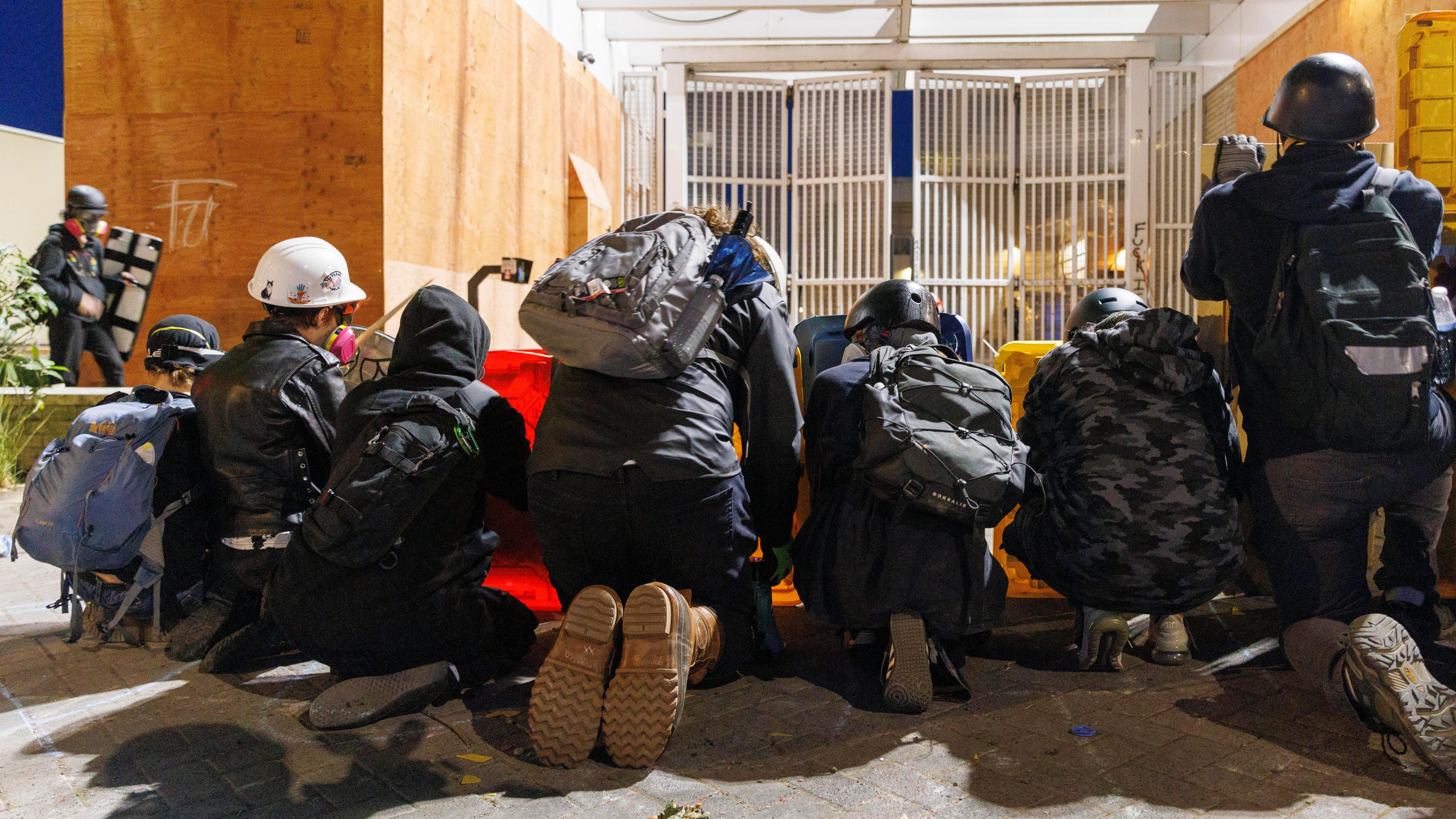A resident of a low-income apartment building across the street from the U.S. Immigration and Customs Enforcement building in South Portland is asking a judge to compel the city to enforce noise codes on protesters who are using sirens and bullhorns to harass ICE agents around the clock.
In a lawsuit filed Tuesday in Multnomah County Circuit Court, Cloud Elvengrail’s attorney says the 24-hour protest outside the ICE facility has trapped Elvengrail amid “shrill, high-pitched buzzers and bells, screeching and piercing whistle-type sounds, and sounds that mimic air raid warning sounds—the type of which might be used to give notice of a nuclear bomb was being launched and headed in one’s direction.”
Elvengrail is a tenant of Gray’s Landing, a 209-unit subsidized housing complex operated by Reach Community Development Corp., an affordable housing nonprofit. The lawsuit notes that she is Black and disabled. She has no air conditioning, the lawsuit says, and opening her windows to cool down her fourth-floor 700-square-foot apartment increases the noise.
“Because she cannot drive and cannot afford to leave her residence to seek shelter elsewhere,” the lawsuit says, “she is trapped with nowhere to go to seek a reprieve from the nightly onslaught of noise.”
The July 8 legal filing is a writ of mandamus—which means it is asking the court to provide relief by compelling the government to perform an action. In this case, the action Elvengrail is seeking is for Portland police to enforce noise ordinances that she contends are regularly applied in other neighborhoods.
Elvengrail’s attorney is Julie Parrish, a former Republican state lawmaker who represented West Linn for four terms and is now an attorney with the Portland firm of Kell, Alterman & Runstein.
The lawsuit adds a new factor to the tensions on South Moody Avenue, where for more than a month the driveway of the ICE facility has been ground zero for resistance to President Donald Trump’s campaign of deportations. More than a dozen people face federal charges for their actions—ranging from resisting arrest to attempted arson—in regular confrontations with federal agents. In the past week, Trump’s border czar Tom Homan has pledged to visit Portland and “ramp up” the feds’ response to protesters, while Portland city councilors have discussed revoking ICE’s permit to operate its facility.
Elvengrail says her desired outcome is simpler: quiet.
“I am living in constant pain, my ears are ringing, the sound is so loud it made my left ear bleed, and there is no peace or quiet because the sound weapons they’re using day and night are killing us,” she told WW in a statement. “And we’re trapped with no escape. It’s got to stop. Those of us in the building with PTSD are destroyed by this noise.”
By her own account, Elvengrail has developed an adversarial relationship with the protesters below her window. In her lawsuit, she says she has gone downstairs twice to “confront” protesters, resulting in arguments in which she says the demonstrators threatened her. She’s called the police a dozen times, and went on KATU-TV to explain her plight. Videos she’s posted on social media of the noise were shared by conservative media figure Andy Ngo, an avowed foe of Portland leftists, and she says she’s been doxxed by ICE protesters.
The effects of confrontations between ICE and protesters on South Waterfront residents were examined by The Oregonian last month. Elvengrail’s lawsuit largely matches previous reporting: The gas deployed by federal agents seeps into the neighborhood, and the protesters’ use of a long-range acoustic device continues after midnight.
On a recent visit to the site in daylight hours, WW observed a loudspeaker playing a recorded message urging ICE agents to “repent for your sins.” On another occasion, no message was being broadcast but a protester held up a sign asking passing motorists to “honk if you hate fascists.” Many did.
Mayor Keith Wilson has walked a fine line overseeing the Portland Police Bureau in these circumstances. He’s said that police will observe the scene and arrest people they see committing crimes at the ICE facility but will not interfere with peaceful protest or directly assist federal agents. He has repeatedly noted that Portland, as a sanctuary city, will not assist in immigration enforcement, but that distinction grows hazy when citizens begin to obstruct ICE’s operations.
Elvengrail is asking the court to break that logjam by making the city enforce noise ordinances within 500 feet of her apartment—or, if the police bureau lacks the resources to do that, enter into an agreement with another law enforcement agency to stop the noise.
The Portland City Attorney’s office did not respond to a request for comment.

